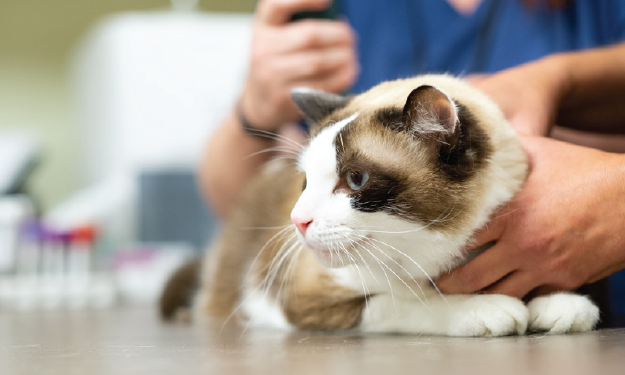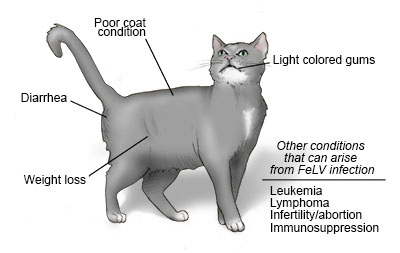
Life expectancy of cats with lymphoma depends on many factors such as where the cancer is and how early it was diagnosed and treated. The cats that react well to this type of treatment survive for a period ranging between 4 and 6 months.

I have no regrets and I am so glad that I continued treatment.
How long do cats with lymphoma live. The life expectancy of a cat with lymphoma will depend on a few factors including. How early it is detected What type of treatment does the cat receive Whether the lymphoma can be surgically removed The location of the lymphoma. How long do cats with lymphoma live.
Depending on the type of lymphoma and the response to chemotherapy cats with lymphoma can live for up to three years. Renal and mediastinal lymphoma have a poorer prognosis and even aggressive. These cats show an average survival time of 9-12 months with the initial response to treatment often giving an indication of survival time.
Renal lymphoma unfortunately carries a very poor prognosis. Average survival with this type of lymphoma is only 3-6 months though there are isolated reports of cats surviving far longer. How Long Do Cats With Lymphoma Live.
Life expectancy of cats with lymphoma depends on many factors such as where the cancer is and how early it was diagnosed and treated. Generally speaking the life expectancy is between 4 weeks to 2 years. How long do cats live after being diagnosed with lymphoma.
There are a lot of variables so it depends. If youre able to treat the lymphoma and your cat responds well your cat could live anywhere from seven months to three years. Clinical Veterinary Advisor 3rd Edition.
If your cat has high-grade or large-cell lymphoma the prognosis for untreated cats is guarded with an average survival time of approximately two months or less. Combination chemotherapy with a three to five drug combination alongside with prednisolone is the standard of care treatment modality. Cats who are treated for lymphoma can get almost two years of life much of it with little or no pain.
If you do nothing or if the treatments no longer work in end-stage lymphoma the average life expectancy is. Life Expectancy of Cats with Feline Lymphoma Chemotherapy seems to be effective in around 70 percent of the cases. The cats that react well to this type of treatment survive for a period ranging between 4 and 6 months.
High-grade lymphoma in cats has a standard life expectancy of 3-10 months even with aggressive treatment. They may have an initial response to the selected treatment but may decline in. Some of the people on the Lymphoma group had cats with the small cell variety that were living 6-8 years.
Every case is different but I just wanted to share my experience. I have no regrets and I am so glad that I continued treatment. Generally however even cats who responded favorably to chemotherapy will experience relapse within a year of the initial diagnosis.
Chemotherapy the second time around is far less effective and care will typically be focused on making the cat as comfortable as possible. Few cats live longer than 14 or 15 months after their diagnosis. Because cancer takes so many different forms and affects so many different parts of the body it is virtually impossible to make generalizations about life expectancy.
Even if two cats have the same type of cancer it could affect one more drastically than the other. The statistics and data I memorized in order to become a board certified medical oncologist tells me that without treatment dogs diagnosed with lymphoma live an average of one month. With treatment survival time is about 12 months.
This information was relayed to both owners including expected quality of life both with and without treatment. Cats may experience lymphoma of the nose which can cause sinus congestion nasal discharge sneezing and difficulty breathing. Lymphoma is a cancer of the white blood cells.
In cats there are multiple manifestations of this disease and they are typically distinguished by the anatomical site that is affected. Certain anatomic presentations are associated with an improved prognosis such as nasal lymphoma and lymphoma of the cranial mediastinum lymphoma arising in the. Between 50-75 of cats with gastrointestinal large cell lymphoma receiving CHOP chemotherapy respond to treatment and their prognosis is between 6-9 months.
Cats that achieve a complete remission live longer than those achieving a partial remission and a small percentage can live more than 2 years. Most cats however will not live more than a year following a diagnosis of lymphoma. Life expectancy of lymphoma without treatment is rarely more than six to eight weeks and pleural effusion with lymphoma in a feline if left untreated can kill a cat in a matter of days or sometimes hours.
The survival time is highly variable ranging from a few months to less than two years. How long can a cat live with liver cancer. The prognosis for feline liver cancer depends upon the type of cancer.
Some metastatic liver cancers may dramatically shorten your pets lifespan while primary liver tumors such as biliary cystadenomas are often benign and may be cured surgically.